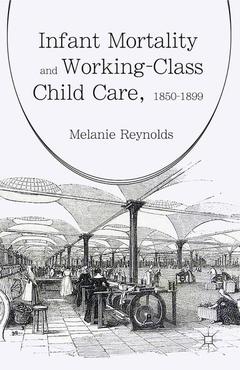Description
Infant Mortality and Working-Class Child Care, 1850-1899, 1st ed. 2016
Author: Reynolds Melanie
Language: English
Keywords
Infant Mortality; Child care; Industrialization; Poor law; Medical history; care; history; history of literature; law; model; tradition; women
Approximative price 52.74 €
In Print (Delivery period: 15 days).
Add to cartPublication date: 03-2018
Support: Print on demand
Approximative price 52.74 €
In Print (Delivery period: 15 days).
Add to cartPublication date: 02-2016
251 p. · 14x21.6 cm · Hardback
Description
/li>Contents
/li>Biography
/li>Comment
/li>
Infant Mortality and Working-Class Child Care, 1850-1899 unlocks the hidden history of working-class child care during the second half of the nineteenth century, seeking to challenge those historians who have cast working-class women as feckless and maternally ignorant. By plotting the lives of northern women whilst they grappled with industrial waged work in the factory, in agriculture, in nail making, and in brick and salt works, this book reveals a different picture of northern childcare, one which points to innovative and enterprising child care models. Attention is also given to day-carers as they acted in loco parentis and the workhouse nurse who worked in conjunction with medical paediatrics to provide nineteenth-century welfare to pauper infants. Through the use of a new and wide range of source material, which includes medical and poor law history, Melanie Reynolds allows a fresh and new perspective of working-class child care to arise.
Introduction
1. The Scholarship of Working-Class Women's Waged Work and their Child Care
2. Industrial Mothers
3. The Workhouse Nurse
4. The Workhouse Infant Diet
5. Day-Carers and Baby-Minders
Conclusion
Melanie Reynolds is Associate Lecturer at Oxford Brookes University, UK and was previously Tutor in History at Ruskin College. Her other publications include 'A Man Who Won't Back a Woman is No Man at All': The 1875 Heavy Woollen Dispute and the Narrative of Women's Trade Unionism' in Labour History (2006).
Examines working-class mothers’ child caring practices in the north of England during 1850-1899 and their relationship to it
Challenges existing accounts, arguing that working-class mothers were responsive and responsible towards their infants
Offers a new interpretation and investigative methodology of value to researchers in history and other disciplines associated with this area




